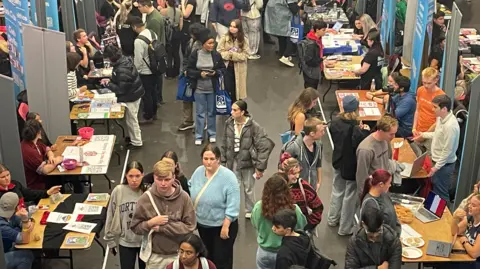 Jordan Andrews
Jordan AndrewsOnly days after arriving at university for the first time, Jordan Andrews had an interview for a part-time job, knowing that he would have to work in order to enjoy the social side of student life.
The 18-year-old from Carmarthenshire worked out that his maintenance loan would not cover more than the bare minimum while studying at the University of Sussex.
Students from Wales have access to more support with living costs than counterparts from elsewhere in the UK, but website Save the Student said in general students are “surviving not thriving”.
Young people starting their courses are being urged to seek out discounts and bursaries and ask for advice if they are struggling financially.
“There will be times where other flatmates and people I know can go out, but I simply cannot afford it until I find work,” said Jordan, from Burry Port.
He is looking for bar work, and has already had one interview, with another lined up.
Jordan is worried he will not be able to make the most of his first few weeks of student life, and has calculated rent for his accommodation just outside Brighton will take up 50% to 60% of his loan.
Text books for his law and politics course will also take “a big chunk” of his budget, and he has stopped buying coffees while out-and-about.
“It’s a very little thing, but it seems to stack up”, he added.

For all Welsh students, there is a minimum maintenance grant of £1,000, and depending on household income, it rises to a maximum of £8,100 if you are living away from home outside London.
It can be topped up with a loan so that the overall level of support for students outside London reaches £12,150 and up to £15,170 in London.
Though this is more than English students can claim, the Higher Education Policy Institute (HEPI) said it falls short of the costs which it estimates to be £18,632 a year outside London to have a minimum acceptable standard of living.
Support for Welsh students covered 65% of this – which was more than students from other parts of the UK – but it still left a gap, the think-tank said.
Universities Wales said the pressure of living costs was being felt in university communities everywhere and institutions were “working proactively to help students who are struggling with financial hardship”.
 Save the Student
Save the StudentResults of an annual student money survey suggested that 67% of students across the UK skipped meals sometimes to save money.
Save the Student’s communications director Tom Allingham said they were also cutting back on going out.
At the same time families are struggling so “students are requiring more support than ever before, at the exact time that for many families, they’re less able than ever before to give that financial support to their children”.
What university help is available?
Details on contacting universities’ student money advisers are on their websites.
Most have hardship funds and many offer freebies.
Swansea University said it had seen a 2.5% increase in applications for its hardship fund this year compared to the same time in 2023.
Last year it was up 10% on the previous year.
It has introduced a one-off accommodation payment of £750 in response to rising rental costs.
At Cardiff Metropolitan University, the maximum hardship fund award has gone up to £2,000 to recognise increased costs.
There is a “Come dine with Met” campaign to help build knowledge and skills around eating cheaply and healthily, and awareness-raising sessions to respond to increased exposure to the risks of gambling and cryptocurrency.
Cardiff University Students Union officer Catrin Edith Parry urged new students to contact the union money adviser or the university if they find they are struggling with money.
“We do our scheme called Feed your Flat – that gives people the opportunity to come here and get five free items of food and essentials for their home”, she adds.

How can students find part-time work?
Many universities now provide information on finding part-time work on their websites or even hold part-time jobs fairs.
Universities sometimes hire students to help with events and open days.
A survey by the Higher Education Policy Institute found that just under half of Welsh students who responded undertook paid employment which was below the UK average.
But those who did work, did so on average for 16 hours a week – higher than the UK figure, and at a level which could start having an impact on their studies.
Jordan Andrews plans to work 12 to 16 hours a week behind a bar – “It’s something easy, I can do on the side”, he said.
How else can students save money?
There are several big, well-known student discount providers, but Tom Allingham from Save the Student said it is worth asking in smaller shops or restaurants, particularly in student-heavy areas.
“By asking, the absolute worst thing that can happen is they say ‘no, sorry, we don’t do a student discount’, and the best thing that can happen is that you get 10, 20, 30, whatever percent, off your bill,” he said.
Another tip from Save the Student is to explore the hundreds of bursaries, grants and scholarships offered by businesses, charities and local authorities.
Tens of millions of pounds go unclaimed every year, says Tom Allingham.
He also said that choosing the right bank account, with a good-sized 0% overdraft facility, is crucial.
Is university worth it?

Recent graduate Famke Veenstra-Ashmore has been researching why fewer Welsh 18-year-olds applied to university this year for the Higher Education Policy Institute.
There could be a number of factors at play, said the 22-year old from Penarth, Vale of Glamorgan, but costs could be putting some people off.
“Lots of students are having to socialise less, going out less, having to spend less time doing what would be viewed as traditional university experiences,” she said.
Having studied for an undergraduate and postgraduate degree, Famke has a student debt of over £50,000 and can understand why some young people look at other options.
But the negatives are outweighed for her by “the opportunity to meet people from across the world and engage with the subject that they love”.
“I think university is definitely worth it in terms of the experience that you get out of it,” she added.




